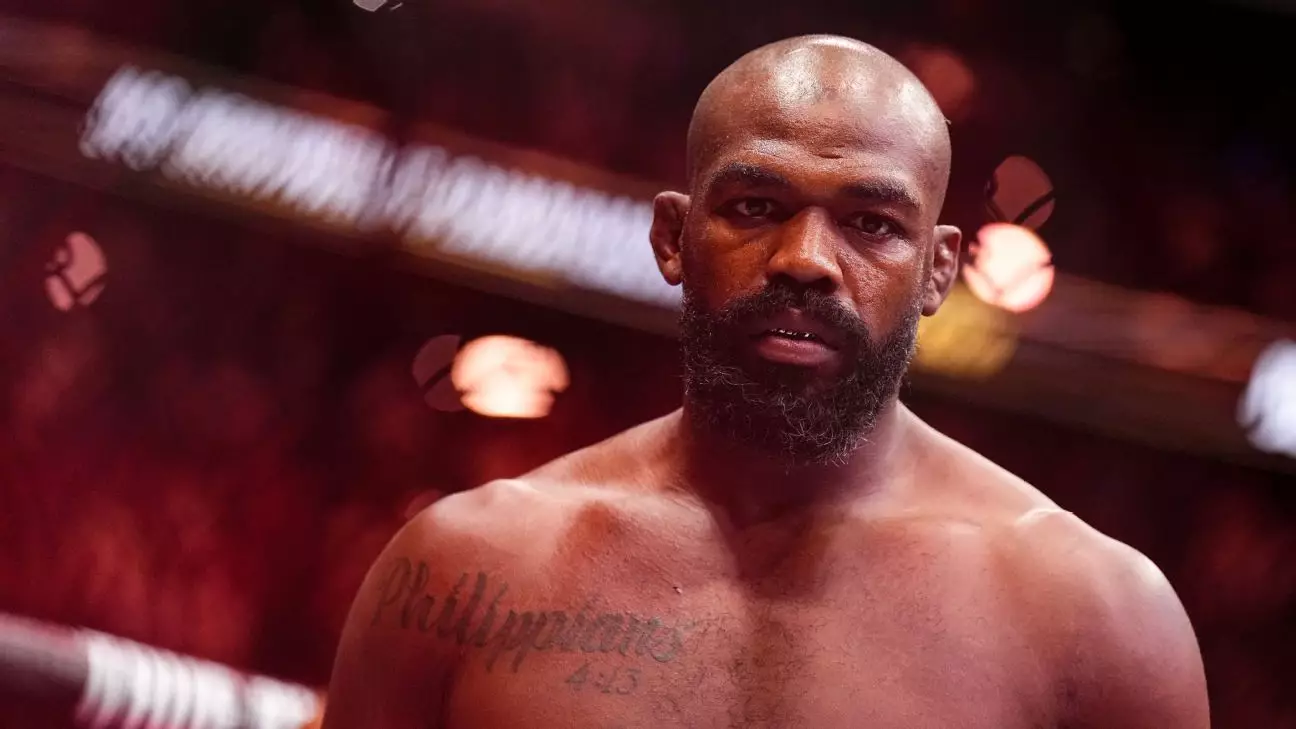Jon Jones, often hailed as the greatest mixed martial artist in history, has recently made headlines with his announcement of retirement, a moment far less climactic than many anticipated. The backdrop for this decision unfolded at a post-fight press conference delivered by UFC CEO Dana White in Baku, Azerbaijan—where White’s demeanor showcased palpable disappointment. This underwhelming revelation paints a stark picture of a man who has consistently operated on his own terms, leaving fans and promoters alike grappling with frustration and anticipation.
Jones’ career trajectory has been nothing short of tumultuous, marked by his exceptional skill in the cage and a penchant for controversy outside it. So, when he chose to announce his retirement rather than face highly-anticipated rival Tom Aspinall for the heavyweight title, the mixed reactions were not surprising. Was this truly the end for Jones, or merely another chapter in a narrative defined by unpredictability and self-interest?
A Legacy of Selfishness
Notably, Jon Jones has carved out a reputation as one of the most self-centered fighters in UFC history. This characteristic, while detrimental to relationships with promotional bodies and fellow fighters, has undeniably contributed to his formidable career. Eschewing the opportunity for a heavyweight title clash against the emerging star Aspinall in favor of bouts that would bolster his legacy—in particular against a 42-year-old Stipe Miocic—speaks volumes about his priorities. This dismissal of Aspinall as an “unproven” opponent reflects a sense of entitlement that has often overshadowed his remarkable fighting abilities.
Dana White’s earlier proclamations regarding a fight between Jones and Aspinall, which he guaranteed would take place, now stand in stark contrast to the reality of Jones’ retirement. White’s frustration cannot be overstated: “The fight was done,” he stated, leaving fans and analysts pondering why Jones reneged on commitments that many believed were etched in stone. While some may argue that every fighter is entitled to prioritize their career and legacy, Jones’ decisions seem to epitomize a calculating selfishness at the expense of sporting integrity and fan expectations.
Historical Patterns of Evasion
Jones’ history reveals a pattern of avoiding high-stakes confrontations. His decision to forgo a title fight with Aspinall is reminiscent of his 2012 decision to decline a short-notice fight with Chael Sonnen, a decision that resulted in the first cancellation of a UFC pay-per-view. White’s outrage at the time illuminated the gravity of Jones’ choice—it was not merely an isolated incident but rather a reflection of a broader theme: Jones prioritizes his narrative above the sport itself.
Thus far, other champions within the organization have demonstrated the same readiness to fight on short notice—Islam Makhachev being a prime example. Yet Jones appears to operate from a different playbook, one governed by personal goals rather than the traditions of martial arts. This behavioral pattern begs the question: Does his talent and legacy justify the break from expectation, or does it tarnish the sport?
The Price of Personal Choice
Jon Jones’ choices pose significant implications for the UFC and its growing fanbase. With a career filled with both triumphs and missteps, the mixed reactions to his retirement highlight the long-standing dilemma within the sport—what should fighters prioritize? In Jon’s case, it is clear: he prioritizes control. Whether it’s negotiating a favorable fight or making timely exits, his career has often operated as a calculated play to maximize his personal brand and status within mixed martial arts.
In a sport so heavily reliant on the excitement of match-ups, Jones’ hesitance to engage high-profile matches against younger opponents raises legitimate concerns about the future of legacy wrestling. The UFC requires fighters who are willing to take risks and engage with the most formidable opponents available, yet Jones has often sidestepped these opportunities.
A fascinating aspect of his retirement narrative is the leverage it provides him. In a world where the fight game is ever-evolving, retirement can serve as an advantageous tool for negotiations. By choosing to step away, Jones potentially sets the stage for a dramatic return—should he choose. In a sense, his retirement announcement could easily be a strategic maneuver rather than an end, keeping him firmly in control of his narrative while monopolizing headline space.
A Fighter’s Battle with Legacy
In terms of legacy, Jon Jones stands at an intriguing crossroads. Historically, his dominance in the octagon has been marred by outside-the-ring issues and a complex relationship with fans who oscillate between admiration and disappointment. While his record boasts an impressive collection of victories against formidable foes, the latter portion of his career tells a different story—one marked by infrequency and controversy.
Fans are left to wonder whether this retirement is the culmination of Jones’ storied journey or merely another chapter in a long saga defined by his decisions. Are we, as fans and supporters of the sport, ready to disentangle the brilliance of his fighting skills from the cloud of selfishness that often accompanies his persona? The answer remains elusive, and as Jones walks away from the sport—perhaps temporarily—the conversation continues, a somber reflection on the price of greatness in the electrifying world of mixed martial arts.

